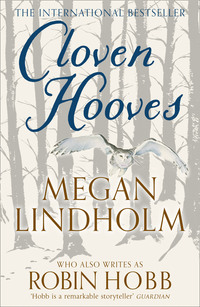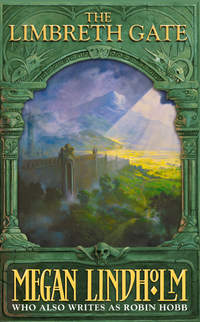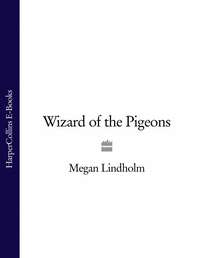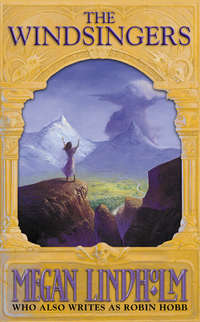
Полная версия
Cloven Hooves
I cancel that thought as soon as it surfaces, disturbed by my own growing paranoia. I cannot understand what is happening to me. Sometimes, when I think about it, I am frightened.
Teddy considers my question gravely, and I await his answer solemnly. “Yes, Mom, I think I would like to stay. I could have a pony, and go to school in the very same school that Daddy attended when he was a boy my age. And when Bix gets better, he’s gonna teach me to run the big tractor. And I’ll be a man, not a little sissy.”
His eyes light up as he finishes this speech. No doubt the thoughts please him, but it disturbs me a little to hear them couched in phrases fresh from Grandpa’s mouth.
“Well, I suppose we’ll probably stay then,” I say lamely. A cruel temptation rises in me. It would be so easy to say, “Too bad your poor puppy will be all alone this summer. Too bad your Tonka trucks have to sit on their shelves and get dusty, too bad Eddie-down-the-road will have no one to swim with him in the gravel pit this summer. But I guess a pony is worth it. I hope our Bruno puppy doesn’t run away because he’s so lonely. I hope no one breaks into our cabin and steals all your toys. I hope mice don’t chew up your stuffed animals.” I could show them how it’s really done, how you twist a kid’s head until he doesn’t know what he wants, how you scare him and torment him into wanting what you want him to want.
But you don’t do that to children you love, and that is how I know they don’t really love Teddy. By the way they use him to manipulate Tom and me. Perhaps tonight I will point that out to Tom, open his eyes to how we are being used. Or perhaps tonight I will step in front of a speeding locomotive and halt it with my upraised hand. Teddy finishes eating and carries his dishes unsteadily to the sink. He lifts his hand in silent farewell, the ultimate in cool, and I respond in kind. He grins suddenly and flashes past me and out the door, is gone faster than a red fox disappearing into tall grass. He will do whatever it is small boys do all day when their mothers are careful not to bother them. I will not spoil things by asking what it is he rushes off to do. Whatever it is, it belongs to him. A boy needs time on his own.
But what if he is not on his own? I begin to tot up the time he spends at home with me, as opposed to the time he spends at Grandma’s big house. Well, they have the television. Add a lot of time on that score. And they have a full-stocked refrigerator, and a freezer that Auntie Steffie keeps full of Fudgsicle bars and Eskimo Pies. A major draw. And no one imposes discipline on him. If he becomes unbearable, they simply send him back to me. More and more, I slowly realize, I am becoming the punishment, the place you are sent when you’re bad. I’m the “take a bath, pick up your toys, brush your teeth, go to bed” person. The candy-givers live next door.
I realize my teeth are clenched so tightly that my jaw aches. I have been polishing the same spot of table for the last five minutes. I rock back on my heels and raise my cold hands to my sweaty forehead. Try to calm down, I tell myself reasonably. Every day you get further and further out. These are not wicked evil people. They are simply run-of-the-mill grandparents, enjoying their grandson during the first long visit they’ve had since he was born. All grandparents love to spoil their grandchildren, love to give them candy and privileges, toys and ponies. If Mother says no, ask Grandma, says the T-shirt. I smile ruefully to myself. Calm again. Real.
What is coming over you, I ask myself soothingly. What makes you think these wild things? What ignites your territorial fury, what sets you off so quickly these days? A shiver of cold fear touches me. What is happening to me? Lately I see only the worst in anyone’s motives, including Tom, Tom who I love above all else, beyond all reason or safety. If I can doubt Tom, who is left for me to believe in? What has happened to the safety of our marriage? We never quarrel, we never nag each other, we laugh together, and he holds me warm at night. He is tall and handsome and strong and he loves me. I know this is so. But sometimes it seems that whenever his parents come into the picture, we are at each other’s throats. What is becoming of my serenity, the inward peace I have so carefully cultivated? I feel pieced together, like a shattered china cup mended with the wrong glue, knowing that the next time they fill me, I will again shatter, scalding all within reach.
I make another little space in my self. There, I tell myself, you’ve seen the problem. Well, it’s simply solved. Just start fresh, today, turn over a new leaf, be a better person, refuse to be prey to these feelings. Make a resolution, right now. No more nagging. No more emotional arguments. Decide all on logic. Show Tom a little more affection, make him love you again. Support your husband in this thing he needs to do. He perceives staying here as the payment of a debt, as evening out with his folks for all they have done for him. How can I begrudge him that? He needs to do this thing, to make peace with himself.
I make a hot cup of tea to calm myself. Tea bag in the cup. Water in the kettle. Kettle on the stove. Put the dishes away while the kettle heats. Pour the steaming water into the cup. Breathe in the comforting aroma of brewing tea. Remove the bag. Put in the sugar. Sit in the chair by the window. Concentrate for just a few moments on these very simple movements, let them be a ritual of serenity. Breathe deeply and unwind.
I sip my tea and shut my eyes for a moment. The old familiar images rise to my mind. Think of a black room, completely dark. A small shining white thread stretches across the floor of the room. That is my idea of sanity. If I can spend my whole life walking through that dark hall, balancing on the white thread, never breaking it, then I will remain normal. Be accepted. But it is such a temptation to just relax, to let go, to fall from the sharp and cutting edge of rationality into the deep warm blackness of my own world.
Pan comes from my blackness. I know that. Pan had to come from the blackness. When I had decided I wanted to be real, all those years ago, I had banished him to that blackness, to the hidden closet of my mind. Traded in a bizarre illusion for a real life, for Tom and later Teddy. I had left the old loneliness behind, and with it I had abandoned the dreams I had fabricated for dealing with it. Pan, my imaginary companion, had been a defense mechanism, a tool for dealing with isolation. And now he is back. What does that mean? Forget it. Just forget it for now. Turn to the matters at hand. Chores to do, a life to lead. I sip at my tea. It’s cold.
The rest of the day slips past me just as elusively. I do housework. That is all there is for me to do. There are no vehicles free for me to drive to town, and one does not drive to town frivolously, not when Mother Maurie is keeping track of the gasoline. The gardens outside the houses belong to Mother Maurie and are faithfully tended by Ellie. One must not walk through the planted fields lest one crush the new plants. There are the woods, of course, beyond the chicken yard. But there is nothing there for me, and no reason to go there.
So I do housework. Generic tasks. Sweeping the same floor I swept yesterday, dusting the same shelves, cleaning the same bathtub. I fix a careful lunch for myself at noon. Tuna-fish sandwiches, cut into triangles, a handful of potato chips, a pot of tea. Tom will not be home for lunch, he is discussing business at the big house. Teddy is with him. I eat my tuna in careful bites, wondering what would happen if I went over there, if I knocked on the door and walked in. Would they all look up from the big table in astonishment, wondering who had come to disturb them at their meal, who had come breaking into a family’s time together? Ridiculous. They’d smile and greet me, make a place for me at the table. But there’d be the question, from Mother Maurie, most likely. “Why, Evvie, how nice! And what brings you over today?” And I would have no answer, would die before I said, “I’m lonely, I want to see my husband, I want to watch my baby eat.” Those reasons are not good enough for practical people like the Potters. I have no real reason to go over there, nor desire to sit through a noon discussion of hydraulic hoses and whether the stock of gaskets is sufficient. It would be pointless to go over there, and silly.
After lunch, I have my lunch dishes to wash, and to dry, and to set carefully away. It is good to be busy. After the dishes, I read a romance. This one is about pirates. Their captain is actually a kidnapped nobleman who has won the respect of the pirates and becomes their captain by his skill with a sword. All he wants is to regain what is rightfully his, and he sets out to recapture one of his own ships, now carrying the loutish cousin who arranged to have him kidnapped so he could inherit the pirate captain’s rightful place. Also aboard is his loutish cousin’s beautiful and willful fiancee, Desiree. She has raven tresses and a bee-stung lower lip. She pouts beautifully, and doesn’t wish to marry the loutish Alfred, but has been forced into it by her father, who thinks only of money. David, of course, captures the ship and takes her prisoner and holds her for ransom, thinking to make his loutish cousin Alfred very unhappy. Desiree hates David at first, thinking he is just a greedy pirate, interested only in money, much like her father. But even as she is hating him, she has to think constantly about his broad shoulders and white teeth, his roguish smile and dancing blue eyes, and the elegant way he put his own cloak around her to cover her after one of his less civilized pirates had ripped her bodice …
“If we’re staying here this winter,” I say, being careful to always say, “if,” not “since,” “then I suppose I should look around for a job. What do you think?”
“Just a sec,” Tom said, not even looking up. Evening has come, greying the windows and leaking shadows into the house. The table is an island awash with yellow light. The rest of the kitchen is a gloomy, huddling place. Tom’s heavy tractor manual has a yellow cover, stained with diesel. Tom’s notes and a schematic take up the rest of the tabletop. There is no room for me to share the table. “I’ll talk to you in just a second, honey. I’m sure the problem is in this section of the hydraulics, and I think I can find it if I’m just left alone for ten minutes straight. Okay?”
I don’t answer, but he doesn’t notice. He is already submerged in valves and lines, filters and clamps. It doesn’t bother me. There are other things for me to do. Teddy is ready for bed, has been tubbed and scrubbed, and now waits, red-cheeked, for a bedtime story. He is a little pinto himself now, my boy, his innocent butt white still, but the rest of him baked brown right down to the top of his sneaker lines. His fair hair has turned ashy white, his face tanned so dark that his blue eyes are a shock. I sit on the floor by the wicker sofa that has been spread up as a narrow bed.
“What shall we read?” I ask, but it is really a rhetorical question. Where the Wild Things Are is already set out by his bed. We have read it every night for the past three months, and he shows no sign of tiring of it. I do not mind, even though I can now recite it. There is something in this book for Teddy, and once he has digested it, he will be ready to go on.
“This one,” he says, and presents me with a Little Golden Book about Scooby-Do. With some reluctance I accept it, leaf through its stiff newness.
“Auntie Steffie gave it to me. He’s our favorite. When I go over Saturday mornings, we watch Scooby-Do together, with Pop-Tarts.”
The ultimate cultural experience. We read the new book slowly, with Teddy taking great care to examine every picture. It is the same story that they use for all the cartoons, and Teddy seems pleased with its familiarity. When we are finished, I cannot resist saying, “Well, I think I like Where the Wild Things Are better.”
“It’s okay,” Teddy concedes. “But it’s not real.”
“And a talking dog that hunts for ghosts is real?”
He frowns. “It’s real in the story. Not a dream. Auntie Steffie says that Max falls asleep in his bed and just dreams the Wild Things. She says that he had a bad dream because he went to bed with no dinner, and that’s what the story is really about.”
“Oh,” I say. I try to find the right words. “I don’t think it’s a dream in the story. It never says he falls asleep and then wakes up again.”
“But then how did he get to where the Wild Things are?”
“In the boat. His bed turned into a boat.”
“No. ’Cause that can’t really happen. He just fell asleep and dreamed it. It’s a dumb story, just about a dream someone had.”
He stuffs the Scooby-Do book into the place of honor under his pillow. I pick up Where the Wild Things Are as I stand and take it with me. I think it is my book now, a thing Teddy has outgrown and cast aside. Perhaps I am a thing Teddy has outgrown and cast aside. I feel gutted, hollow. Why did she have to take that away from him? I wonder. Did she even know what she was doing? Is it a malicious cruelty, or only ignorance? And why is it so important to me? Am I worrying about Teddy, really, or am I worrying about me and what she has taken from me, the thing Teddy and I shared? I feel Teddy’s eyes on me and turn back to him.
“Can we get some new books next time we go to town? I had lots of books at our old house and here I don’t have hardly any. Can we get some new ones?”
“What do you mean, our old house? Your books at home still belong to you, and they’ll still be there when we go back. If we stay here much longer, maybe I’ll send for some of them. But not too many, because we’d just have to pack them up again when we go home.”
“Can’t we just get new ones?”
“Maybe. A few. We’ll see.” I tug back the covers that are sliding off his feet, snug them around him. “Don’t worry about it. Daddy and I are going to talk tonight and decide all about when we’re going home. Then I’ll tell you in the morning, and things won’t seem so confusing. We can plan better.”
“Auntie Steffie says she saw a Sylvester and Tweety book in the drugstore.” His eyes are already closing. I don’t reply but reach to turn off the lamp by his head. As I rise once more, he asks from behind closed eyes, “What if we never go back? What if we live here forever and ever? Then would we send for all my stuff?”
“Don’t be silly,” I tell him. “We’ll be going home, and all your stuff will be there and just fine. Now go to sleep.”
I leave his bedside like an actor leaving a darkened area of a stage, stepping into the yellow light of the kitchen and Tom’s set. The light spills in a circle on the table from the pull-down fixture, illuminating Tom’s manual. His hand moves, scratching pencil notes on a yellow tablet. He looks tired, older. His hands are graven dark with diesel and oil, the nails cracked, the downy hair on the backs of his wrists and forearms eaten away by harsh cleansers. The lines at the corners of his eyes and mouth, between his eyes and on his brow, are pale against his tan. He glances up from his manuals, gives me a smile, and goes back to tracing a diagram. As I walk behind his chair he reaches back with his free hand, hooks it around me for a moment, and pulls me up against his back. I hug him suddenly, impulsively, putting my face against his hair, smelling his true scent despite the diesel. He goes, “Mmmm,” and is still for a second. Then he leans forward again, his fingers wander slowly across his diagram, his hand drops away from me. I stand clear of him.
I settle in another chair, across the table from him. I rest my pirate romance on the edge of the table, stealing a bit of light from him, hovering at the edge of his glow, and try to submerse myself in David and Desiree and Alfred. They are all idiots. Boring, stupid people, trapped in a trite plot, who will inevitably do what is expected of them. Alfred will be unmasked as the kidnapper and swindler he is. David will regain his wealth and marry Desiree. How can they be so blind to the other possibilities? And who could have put such an idea in Teddy’s head? Live here forever and ever. The three of us in this cramped little house, forever under the sway of Mother Maurie. I can see me now, a junior wife in the Potter tribe. I smile at the idea and go back to my pirates. But after a while I find myself rubbing my jaw, where the knotted muscles ache.
“Tom? Tom?”
“Yeah, just a sec, Lyn … Okay. What is it?”
He closes his manual on his pencil and looks up at me, sighing. I am seven years old and I’ve been talking during the spelling test. I grope for excuses. “I just wanted to talk to you for a second, honey. Have you given any more thought to staying here for the winter?”
“Sure.” He stretches, rolling his shoulders under his T-shirt. “I told the folks today that it was all settled. Dad was really relieved.” He pauses at the look on my face. “Isn’t that what we agreed on?” He looks genuinely puzzled. Frantically I dig through my memories of the conversation. When had I agreed, when had I told him, sure, go ahead, we’ll stay the winter?
“No, Tom, I don’t think so. I thought we said we’d stay till the end of summer, and talk about the winter. I mean, we need to discuss it more. For one thing, I’d need to find a job, and I can’t think what there is in town. And we’d have to have all our stuff shipped down, which means asking someone to pack it up for us. And we’d have to spend the whole winter here, in this tiny place, and try to find decent tenants for our place and hope they don’t tear it to ribbons …”
My voice runs down. The world tilts around me. Déjà vu. I know what comes next. Control becomes very shaky, things seem to have fuzzy edges. I cannot feel the book I hold. It’s like being washed down a chute. First Tom will be puzzled at my resistance, then irritated. I will surrender rather than anger him. We will stay the whole winter in this wretched little place. Despair washes over me, almost a physical thing. No way to escape this, no way at all. The play is written, I must say my lines.
“Lyn, I can’t go to Dad now, when he’s counting on us, and say that … are you all right?”
I nod, swallowing the nauseous lump in my throat. A great wind of stillness is blowing past me, drowning Tom’s voice. Talk to him, I urge myself, watching his mouth move, his head tilt as he coaxes me to be reasonable. I know what he must be saying, but my ears cannot seem to make out the words. Tell him you’re afraid. Tell him they’re going to take him and Teddy away from you, and you will be left alone in the darkness. Tell him. Tell him now.
But his words are flowing like a river, washing past me, barely touching my ears as they carry us inexorably on. “… that we were staying. It didn’t seem fair to leave them wondering. Mom’s got it all planned out. You can use her washer and dryer on Tuesdays, that fits in with everyone else’s schedule. Steffie was really excited. She’s really a sucker for her little nephew, and she gets so lonely around here in winter. She thought it was great that you and she would get some time together. She’s just full of plans for canning and berry picking this fall, and sewing and cooking together this winter. She really wants to pull you into the family, make you feel like part of the gang. She thought maybe you’d want to go shopping, get some clothes more appropriate for this part of the country …”
The white noise comes up again, washing over me like a wave. I stare through it, trying to see Tom, my Tom. They would pull him into the family machine and absorb him. Then Teddy. Then me. First it would be helping out with the big family meals and sewing and washing in the big house. Maybe by next spring I’d be taking care of the chickens, helping plan the kitchen garden. By the year after it would be as if I’d never existed as a separate person at all. We would all live happily ever after. All I had to do was let go. Surrender. Admit they were right in feeling sorry for me. Admit I needed to be fixed. Stop being me and become Tom Potter’s wife.
“Don’t pull at your face like that, honey. You’ll get wrinkles. So, what do you say?”
Fuck you, Tom Potter, you traitor, traitor, traitor. And fuck me, too, because I am saying, “Well, we’ll have to work out the details as we go along, I guess. It’s just for this winter, right?”
“Of course, honey. You don’t think we’re going to live here forever, do you?”
You bet your ass I do. Why do you smile so warmly and go right back to your manual? I look down at my own book, study the shapes of the words on the page. I read a few, they make no sense. So I try counting them. I used to be able to soothe myself by doing this, counting all the words on a page, but tonight it fails me.
“I’m going to bed,” Tom announces, flopping the old manual shut. He stands and stretches, towering over me in the cramped room. “I want to hit the job early tomorrow, get this tractor back on line. So I’ll get a late breakfast with Dad in town. If you want, I’ll take Teddy with me, you can sleep in.” He pauses. I count words, not looking up from the page. “You’re coming to bed now,” he asks, but it isn’t really a question.
“Yeah, in a second. Yeah.” I turn a page, count some more.
He stands over me a few seconds longer. I can feel his contentment, he has it all. He’s come home to his family, to his old familiar world, his wife is tractable, his son is smart, he has it all. He waits for me a few seconds, then shrugs and trudges off down the hall. As soon as he is gone, I feel my shoulders drop. I can breathe, as if the air has flowed back into the space he occupied. I lean back in my chair, setting my book carelessly atop his scribbled notes, listening to the sounds of Tom going to bed. Water runs in the bathroom. Light switch clicks off in the bathroom, then on in the bedroom. Clump of falling shoes, a rustling of clothing. I hear his belt buckle ring against the floor. More rustling and the bed creaks. Silence. The silence grows longer, becomes indignant.
I know just how he is lying in there. His head is almost under the covers, he is curled on his side. He has left the light burning for me. His eyes are closed but he is far from sleeping. Duty calls me.
I arise and click off the kitchen light. Night flows into the room from the uncurtained windows. There was part of a moon, and stars peeping through the partial overcast. Rain tomorrow, maybe. Rain. Rain for the new crops rising in green rows. Good. Rain for the fields.
Конец ознакомительного фрагмента.
Текст предоставлен ООО «ЛитРес».
Прочитайте эту книгу целиком, купив полную легальную версию на ЛитРес.
Безопасно оплатить книгу можно банковской картой Visa, MasterCard, Maestro, со счета мобильного телефона, с платежного терминала, в салоне МТС или Связной, через PayPal, WebMoney, Яндекс.Деньги, QIWI Кошелек, бонусными картами или другим удобным Вам способом.








